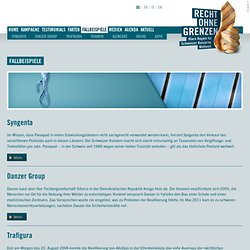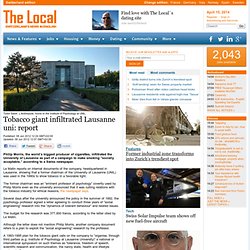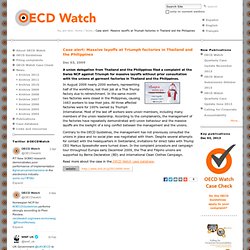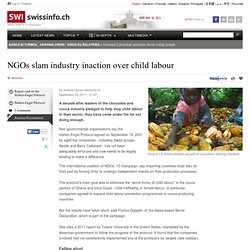

Is China beating up on Swiss businesses? - Quartz. Nestlé-Konzernchef Peter Brabeck: "Zugang zu Wasser sollte kein öffentliches Recht sein." Case Studies - Law Without Borders. Syngenta Im Wissen, dass Paraquat in vielen Entwicklungsländern nicht sachgerecht verwendet werden kann, forciert Syngenta den Verkauf des umstrittenen Pestizids auch in diesen Ländern.

Der Schweizer Konzern macht sich damit mitschuldig an Tausenden von Vergiftungs- und Todesfällen pro Jahr. Paraquat – in der Schweiz seit 1989 wegen seiner hohen Toxizität verboten – gilt als das tödlichste Pestizid weltweit. Mehr Danzer Group Danzer baut über ihre Tochtergesellschaft Siforco in der Demokratischen Republik Kongo Holz ab. Mehr Trafigura Erst am Morgen des 20. Mehr Triumph International Triumph International entliess 2009 in Thailand und den Philippinen über 3'600 Arbeiterinnen ohne vorherige Gewerkschaftskonsultation. Mehr Glencore Glencore baut in der Demokratischen Republik Kongo Rohstoffe ab. Mehr Roche Roche führt in China Studien an Patienten durch, die ein neues Organ erhalten haben.
Mehr Axpo Mehr. Tobacco giant infiltrated Lausanne uni: report. Tudor Sabin.

L'Anthropole, home to the Institute of Psychology at UNIL. Published: 08 Jun 2012 12:24 GMT+02:00Updated: 08 Jun 2012 12:07 GMT+02:00 Philip Morris, the world’s biggest producer of cigarettes, infiltrated the University of Lausanne as part of a campaign to make smoking “socially acceptable,” according to a Swiss newspaper.
Le Matin reports on internal documents of the company, headquartered in Lausanne, showing that a former chairman of the University of Lausanne (UNIL) was used in the 1990s to show tobacco in a favorable light. The former chairman was an “eminent professor of psychology” covertly used by Philip Morris even as the university announced that it was cutting relations with the tobacco industry for ethical reasons, the newspaper says. The budget for the research was 377,900 francs, according to the letter cited by Le Matin. A 1993-1995 plan for the tobacco giant calls on the company to “organise, through third parties (e.g.
Www.amnesty.ch/de/themen/wirtschaft-menschenrechte/state_duty_to_protect. Www.evb.ch/cm_data/EvB_CSR_englisch.pdf. Case alert: Massive layoffs at Triumph factories in Thailand and the Philippines — OECD Watch. Category: A union delegation from Thailand and the Philippines filed a complaint at the Swiss NCP against Triumph for massive layoffs without prior consultation with the unions at garment factories in Thailand and the Philippines.

In August 2009 nearly 2000 workers, representing half of the workforce, lost their job at a Thai Triump factory due to retrenchment. In the same month two factories were closed in the Philippines, causing 1663 workers to lose their jobs. All three affected factories were for 100% owned by Triumph International. Most of the laid off workers were union-members, including many members of the union-leadership.
Contrary to the OECD Guidelines, the management has not previously consulted the unions in place and no social plan was negotiated with them. Read more about the case in the OECD Watch case database. Www.paraquat.ch/data/EvB_Paraquat_Dossier_en.pdf. NGOs slam cocoa and chocolate industry inaction over child labour. A decade after leaders of the chocolate and cocoa industry pledged to help stop child labour in their sector, they have come under fire for not doing enough.

Non-governmental organisations say the Harkin-Engel Protocol signed on September 19, 2001 by eight top companies - including Swiss groups Nestlé and Barry Callebaut - has not been adequately enforced and now needs to be legally binding to make a difference. The international coalition of NGOs, 10-Campaign, say importing countries must also do their part by forcing firms to undergo independent checks on their production processes. The protocol’s main goal was to eliminate the “worst forms of child labour” in the cocoa sectors of Ghana and Ivory Coast - child trafficking or forced labour. In particular, companies agreed to expand child labour prevention programmes in cocoa-producing countries. But the results have fallen short, said Flurina Doppler, of the Swiss-based Berne Declaration, which is part of the campaign.
Falling short.